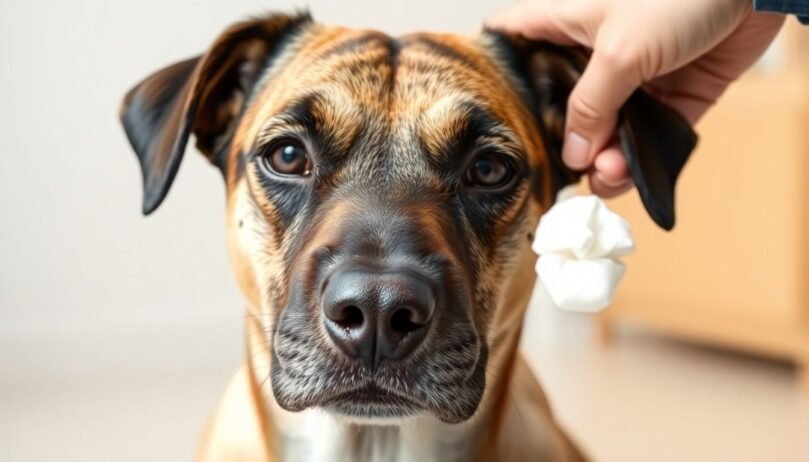How to Clean Your Dog’s Ears
- 14 February 2025
- BuyAPet Editorial Team
- All Dogs, Dog Health
How to Clean Your Dog’s Ears: A Comprehensive Guide
Ear infections in dogs are common—affecting up to 20% during their lifetime. Regular, gentle cleaning helps prevent discomfort, infection, and potential hearing loss. Use this safe, step-by-step guide to keep your dog’s ears healthy.
Understanding Your Dog’s Ears
Identifying Signs of Ear Infections
- Redness or swelling inside the ear
- Foul odour coming from the ear
- Excessive scratching or rubbing
- Brown or yellow discharge
Different Ear Types in Dogs
| Ear Type | Examples | Cleaning Frequency |
|---|---|---|
| Floppy (pendulous) | Cocker Spaniel, Basset Hound | Weekly checks; clean every 1–2 weeks |
| Erect (pricked) | German Shepherd, Husky | Check every 2 weeks; clean every 2–4 weeks |
Note: Frequency varies with activity, swimming, and skin/allergy history.
Gathering Supplies
- Dog-specific ear cleaner
- Cotton balls or pads (no cotton buds/Q-tips inside the canal)
- Soft cloth or gauze
- Treats for positive reinforcement
Step-by-Step Guide to Cleaning Your Dog’s Ears
1) Preparing Your Dog
- Choose a quiet, well-lit space.
- Offer treats to create a positive association.
- Gently hold and reassure your dog.
2) The Cleaning Process
Fill the ear canal with a vet-approved ear cleaner (follow the bottle’s directions).
Massage the base of the ear for ~20 seconds to loosen debris.
Let them shake to expel excess cleaner and debris.
Wipe the visible outer canal and flap with cotton/gauze. Do not insert deep objects into the canal.
Repeat for the other ear and dry the ear flap to limit moisture.
Avoid: Cotton buds inside the canal, excessive force, or repeated cleaning if your dog shows pain.
3) Post-Cleaning Care
- Ensure ears are dry to prevent moisture build-up.
- Monitor for redness, persistent scratching, or discharge.
Choosing the Right Ear Cleaning Solution
Commercial vs. Homemade
- Commercial: Formulated for canine pH; convenient and safe when used as directed.
- Homemade: Diluted vinegar/water may help surface debris but use cautiously and not with irritation or open sores.
Ingredients to Avoid
- Alcohol
- Hydrogen peroxide
- Fragrance or harsh additives
Vet tip: If your dog has ongoing ear issues, allergies, or a history of infections, ask your vet which cleaner is best before starting.
When to Seek Veterinary Attention
Recognise Serious Problems
- Severe pain when touching the ear
- Persistent foul smell or dark discharge
- Lethargy or head tilt
Emergency Signs
- Excessive bleeding
- Severe swelling
- Neurological signs (circling, balance issues)
Stop cleaning and call your vet if any of the above occur.
Regular check-ups: Routine vet exams can catch ear problems early and prevent complications.
Maintaining Healthy Ears Long-Term
- Set a schedule: Every 1–4 weeks depending on ear type, activity, and swimming.
- After baths/swims: Dry ears thoroughly.
- Allergy management: Speak with your vet if you suspect environmental or food allergies.
- Diet: A balanced diet with Omega-3 fatty acids supports skin and ear health.
Key Takeaways
- Gentle, regular cleaning prevents many ear issues.
- Choose a canine-specific cleaner; avoid alcohol and peroxide.
- Know when to stop and call your vet.
Disclaimer: This guide is educational and not a substitute for personalised veterinary advice.
